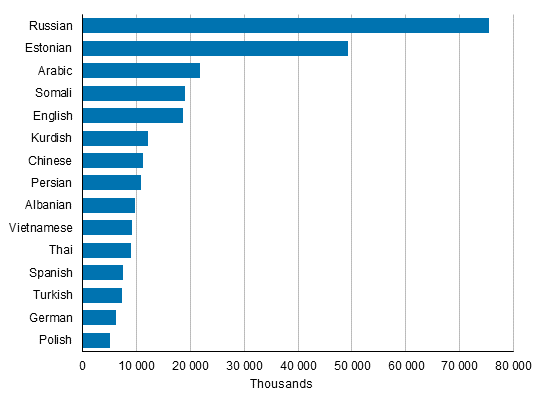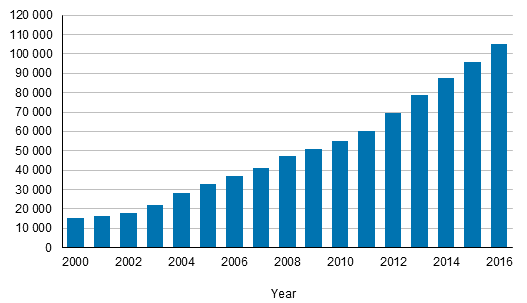Published: 29 March 2017
Arabic became the third largest foreign-language group
According to Statistics Finland’s statistics on the population structure there were 353,993 persons speaking a foreign language as their native language living in Finland in 2016. During 2016, Arabic surpassed those speaking Somali and English as their native language and became the third largest foreign-language group in Finland. There were 21,783 persons who spoke Arabic as their native language.
Largest foreign-language groups in Finland at the end of 2016

Number of persons speaking national languages as their native language went down for the third year in a row
At the end of 2016, Finland's official total population was 5,503,297. In the course of 2016, Finland’s population grew by 15,989 persons. The number of persons speaking Finnish, Swedish or Sami as their native language went down by good 8,000 persons. The number of foreign-language speakers grew by good 24,000 persons.
In all 105,000 persons living in Finland have dual citizenship
At the end of 2016, there were 104,997 persons permanently resident in Finland who held the citizenship of some other country in addition to Finnish citizenship. Of them, 20,324 were native-born citizens of Finland who had been granted citizenship in another country. Altogether, 84,673 persons were foreign citizens who had also been granted Finnish citizenship.
The largest dual nationality groups at the end of 2016 were citizens of Russia, 27,456, Sweden, 7,380, Somalia, 4,650, Estonia, 4,601 and the United States, 3,934.
Number of persons with dual citizenship in Finland in 2000 to 2016

Population increased in seven regions
During 2016, the population grew in seven and diminished in twelve regions. In absolute numbers, the population grew most in Uusimaa, by 18,032 persons, in Pirkanmaa, by 3,242 persons, and in Varsinais-Suomi, by 1,220 persons. The relative population increase was also highest in Uusimaa, 1.1 per cent.
The biggest absolute decrease in population was seen in Etelä-Savo, 1,330 persons and Satakunta, 1,217 persons. In relative numbers, the population decreased most in Etelä-Savo, by 0.9 per cent.
Population in the Helsinki region grew by more than that of the whole country
During 2016, the population grew in 77 and diminished in 233 municipalities. The biggest absolute increase in population was seen in Helsinki, 6,973 persons, Espoo, 4,781 persons and Vantaa, 4,736 persons, The population in the Helsinki region grew by good 16,000 persons in during 2016. Foreign-language speakers accounted for 72 per cent of the population growth in the Helsinki region.
Examined by municipality in Mainland Finland, Sipoo (2.7 per cent), Vantaa (2.2 per cent) Kangasala (1.9 per cent) and Espoo (1.8 per cent) had the largest relative increases in population.
In absolute numbers, the population decreased most in Kouvola, by 549 persons, and in Salo, by 344 persons. Examined by municipality in Mainland Finland, the largest relative decreases in population occurred in Rääkkylä and Valtimo, down by 3.4 per cent, and in Kivijärvi, by 3.3 per cent.
Source: Population Structure 2016, Statistics Finland
Inquiries: Markus Rapo 029 551 3238, info@stat.fi
Director in charge: Jari Tarkoma
Publication in pdf-format (338.3 kB)
- Tables
-
Tables in databases
Pick the data you need into tables, view the data as graphs, or download the data for your use.
Appendix tables
- Appendix table 1. Regional adjustments 1.1.2017 (29.3.2017)
- Appendix table 2. Population according to language by region 1996 - 2016 (29.3.2017)
- Appendix table 3. The demographic dependency ratio by region 1996 - 2016 (29.3.2017)
- Appendix table 4. Finnish citizens with dual nationality by region 2001 - 2016 (29.3.2017)
- Figures
- Quality descriptions
-
- Quality description: Population structure 2016 (29.3.2017)
Updated 29.03.2017
Official Statistics of Finland (OSF):
Population structure [e-publication].
ISSN=1797-5395. 2016. Helsinki: Statistics Finland [referred: 19.4.2025].
Access method: http://stat.fi/til/vaerak/2016/vaerak_2016_2017-03-29_tie_001_en.html

